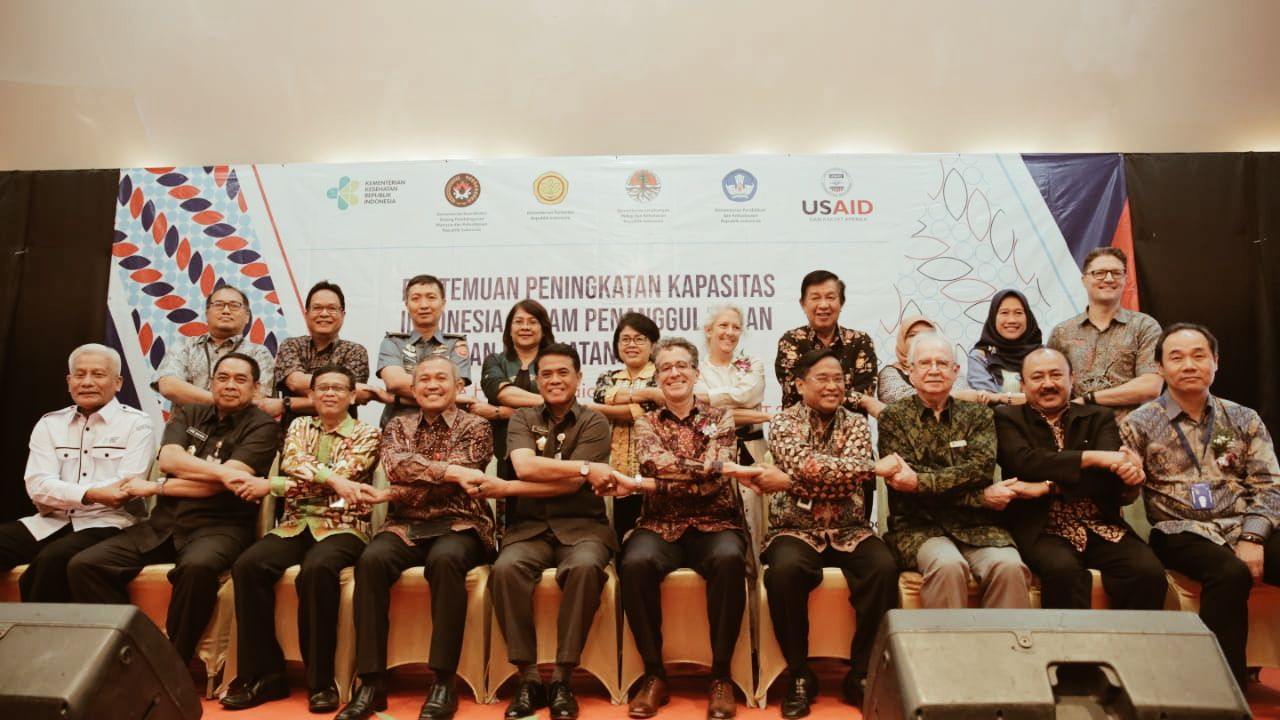
The Government of the United States of America through the United States Agency for International Development (USAID) and the Government of Indonesia work together to support our country in increasing its preparedness, capacity, and response to Emerging Infectious Diseases (PIE) and pandemic threats. This collaboration began since the Avian and Pandemic Influenza (API) program in Indonesia from 2006 to 2010. The partnership then continued with the launch of the Emerging Pandemic Threats (EPT) program which consisted of two phases, namely EPT-1 (2011-2015) and EPT-2 (2015 – 2019).
The program, which has been carried out since 2006, has been considered successful in improving prevention, early detection and response to PIE and pandemics. The focus of EPT is strengthening health workforce capacity and implementing International Health Regulations (IHR) which focus on surveillance, laboratory capacity building, and multi-sectoral coordination for pandemic management. Through EPT-2 program, several collaboration projects has been implemented, such as PREDICT-2, One Health Workforce (OHW), Preparedness and Response (P&R), Community Epidemic and Pandemic Preparedness, and Infectious Disease Detection and Surveillance (IDDS). This collaboration is possible because of such decent coordination and teamwork within the Government of Indonesia through the Ministry of Health, Ministry of Environment and Forestry, and Ministry of Education and Culture, USAID Indonesia, Centers for Disease Control and Prevention (CDC), World Health Organization (WHO), and the Food and Agricultural Organization (FAO), PMI, INDOHUN, FHI 360, and other institutions.

One of the most tangible form of support from the Government of Indonesia in this collaboration is the release of Presidential Instruction (INPRES) No. 4 of 2019 in June 2019. It regulates the Capacity Building in Preventing, Detecting, and Responding to Diseases, Global Pandemics, and Nuclear, Biology, and Chemistry Emergencies. Oscar Primadi, Secretary General of the Ministry of Health, praises the progress as a concrete cross-sectoral support for national programs in the health sector, specifically the awareness and preparedness program against the threat of Emerging Infectious Diseases (PIE) and pandemics.
Fadjar Sumping Tjatur Rasa, the Director of Animal Health Ministry of Agriculture, also said that the Ministry of Agriculture has actively collaborated with USAID through FAO to increase capacity in animal husbandry and animal health through the One Health approach.
Also, 2019 has marked 70 years of diplomatic relations between Indonesia and the United States. The Government of Indonesia and the United States through USAID has also been collaborating for more than thirteen years. We do hope that there would be more collaboration and efforts in order to improve health security and resilience.
“Although Indonesia continues to face the disease threats in the region, its commitment to implementing the One Health approach is a reference for increasing the region’s prevention, detection and response capabilities to achieve health resilience. We are proud to see the success of the partnership over the past five years as part of the 70th anniversary of US-Indonesia relations,” said USAID Indonesia Director Ryan Washburn during his remarks in the EPT-2 Closing Ceremony held at the Sari Pacific Hotel, Jakarta.
Contact person:
- Septa Adi Prasetya, Foreign Cooperation Bureau, Ministry of Health, s.adiprasetya@yahoo.com
- Alexandra Tatgyana Suatan, Communications and National Partnership Manager, alexandra@indohun.org
- Rindu Aninditha Putri, National Communications Officer FAO ECTAD, rindu.putri@fao.org
